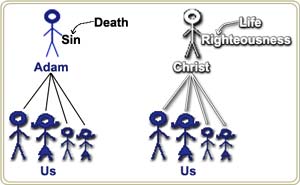Romans 5:12-21
| |||||||||||||||||||||||||||||||||||||||||||||
| Key: |
|---|
Green: on hand out |
Ink: to be filled in on hand out |
Death came to us through Adam's sin; life comes to us through Christ's righteousness

This is what all of history is about, the reason for the creation and existence of the universe. You are part of an on-going story of the triumph of God's grace over sin. At birth, Adam was your spiritual head; if your faith is in Christ, He has become your spiritual head. Justification of the saints works the same way universal condemnation works: by proxy. "As we are condemned on account of what Adam did, we are justified on account of what Christ did."1
"There is a striking analogy between the fall and redemption."2
| ||||||||||||||||||||||||||||||
| (After Wm. Newell3) |
Deeds: Christ's death was righteous, not merely in that it was a good thing to have done. Rather, as Adam's transgression brought about death; Christ's sacrifice brought about new life. Adam's sin took life, Christ's sacrifice gave it. Adam murdered those made in God's image; Christ gave birth to a new race made in God's image.
Verdict: The verdict is passed on all who are descended from the two God-appointed representatives. The one transgression of Adam brought condemnation to all his seed. The one righteous act of Christ brought justification to all his seed.
Inheritance: I Cor. 15:22 Adam's one act of disobedience caused death to pass to all his seed. Christ's one act of obedience caused life to pass to all his seed. The seed of the man is sin, condemnation, and death. The Seed of the woman is righteousness, justification, and life. (Also mentioned in Scripture is the seed of the serpent. That may be an equivalent term to the seed of the man.) But lest we elevate the woman to the status of life-giver, as the pagans do, remember that the Seed of the Woman is a man. He came through the woman, from God. He is the second original Man, the second Adam, the second progenitor of a unique race of beings made in the image of God. Those descended from fallen Adam are fallen from the start; those descended from the Risen Lord cannot fall. I Pet 1:23
Results: Sin used to reign in our mortal bodies because we received the sentence of death through Adam, our father according to the flesh. By faith, we now reign in life through Christ because we have received the abundance of grace and the gift of righteousness.
The two sets of , under Adam and under Christ, are invariable combinations: sin, condemnation, and death are always found together; and righteousness, justification, and life are always found together. The two sets are parallel but antithetical (opposed in character and purpose). They are similar in their principles of operation but contrary to each other in every other way. "Sin sets in operation the inevitable consequents of condemnation and death. Righteousness sets in operation the inevitable consequents of justification and life."4 This passage deals with the particular instances initiated by Adam and Christ, which have universal consequences for those whose lives proceed from them. "Just as sin entered the world through the sin of the one man, so death permeated to all men because all sinned."5
| Sin-condemnation-death to all through Adam | Righteousness-justification-life to all through Christ |
|---|---|
| In Eden, we're not born yet; we can't decide what to do. | In eternity past, before Creation, we weren't born yet; we couldn't decide what to do. | Adam is appointed our representative to decide for us all. When God looks at Adam, He sees all mankind. | The Son of God is appointed our representative. When God looks at Christ, He sees all the chosen. By implication, His incarnation is planned; He will become one of us so that He can justly represent us. |
| By defying God's authority, Adam declared war on God on our behalf, and we were all made God's enemies. The status of all mankind became: at war with God. | By surrendering His life, taking on Himself the wrath of the Father against our sins, we were reconciled to God. The status of the chosen became: at peace with God. |
| The sentence for rebellion is death. That is how, when Adam sinned, we all fell under the death penalty. | The gift of God is eternal life. As Christ was raised from the grave in a glorified body, so our spirits are raised to new life. |
Paul is making an a fortiori argument - that is, one of the form if that, then how much more this! The life we inherit in Christ surpasses in every way the death we inherited from Adam.
Summary: "Therefore as through one man sin entered into the world and death through sin, and so death passed on to all men, in that all sinned, even so through one man righteousness entered into the world and life through righteousness, and so life passed on to all men, in that all were accounted righteous."6
Footnotes:
1, 2: Commentary on the Epistle to the Romans, by Charles Hodge; Eerdman's, 1960; pp. 142-4.
3: Romans: Verse by Verse, by William Newell; Moody Press 1974; p. 176.
4,-6: The New International Commentary on the New Testament: The Epistle to the Romans, by John Murray; Eerdman's, 1973; pp. 179-99.
Recommended reading:
David J. Finnamore
Orlando, FL